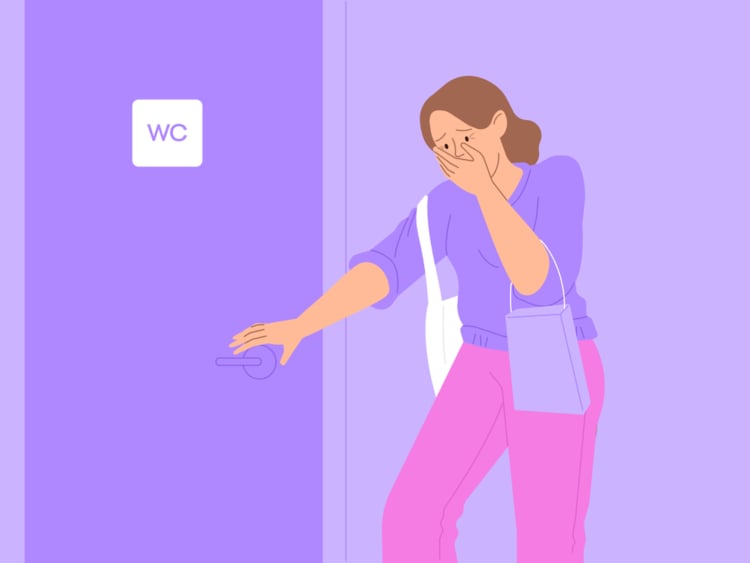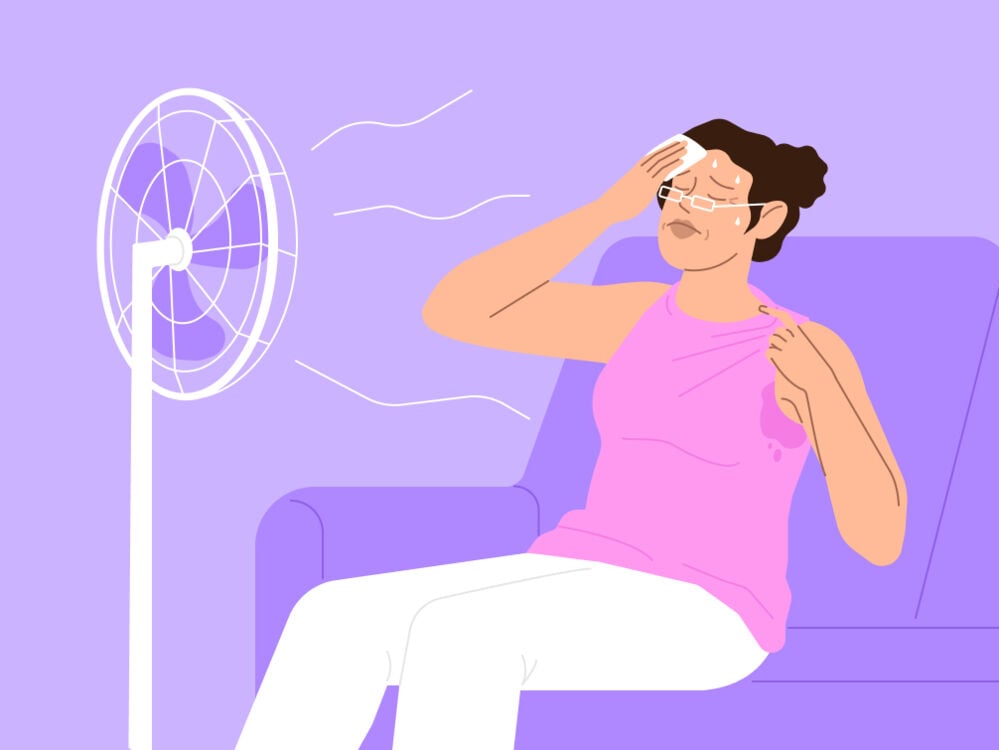While it’s not the most common symptom during the menopause transition, nausea can happen due to hormone shifts. Here are the lifestyle and dietary changes that can help.
-
Tracking cycle
-
Getting pregnant
-
Pregnancy
-
Help Center
-
Flo for Partners
-
Anonymous Mode
-
Flo app reviews
-
Flo Premium New
-
Secret Chats New
-
Symptom Checker New
-
Your cycle
-
Health 360°
-
Getting pregnant
-
Pregnancy
-
Being a mom
-
LGBTQ+
-
Quizzes
-
Ovulation calculator
-
hCG calculator
-
Pregnancy test calculator
-
Menstrual cycle calculator
-
Period calculator
-
Implantation calculator
-
Pregnancy weeks to months calculator
-
Pregnancy due date calculator
-
IVF and FET due date calculator
-
Due date calculator by ultrasound
-
Medical Affairs
-
Science & Research
-
Pass It On Project New
-
Privacy Portal
-
Press Center
-
Flo Accuracy
-
Careers
-
Contact Us
Can menopause cause nausea?


Every piece of content at Flo Health adheres to the highest editorial standards for language, style, and medical accuracy. To learn what we do to deliver the best health and lifestyle insights to you, check out our content review principles.
Not feeling well for no apparent reason? Nausea, or feeling as if you could vomit, is pretty common, and a bunch of factors could be causing it. For example, you might occasionally feel nauseous after eating certain foods or if you have a stomach bug.
But if you’re somewhere between your late 30s and 50s, and your cycle-tracking app shows that your periods have been irregular lately, you might be curious to know if nausea can be a perimenopause symptom. And it turns out your tummy trouble can be hormone related, so it might be a relief to know there are plenty of ways to manage it.
Here, obstetrician and gynecologist Dr. Angela Jones, New Jersey, US, shares everything you need to know about perimenopause or menopause nausea. But if you have any questions or concerns, always reach out to a health care professional for advice.
Key takeaways
- Research is limited, but nausea is a possible symptom of perimenopause (which is the lead-up to your final period plus one year afterward). Doctors think the main cause of this type of nausea is shifting hormones, particularly your estrogen levels, which are in flux around menopause.
- Nausea isn’t always caused by perimenopausal hormonal changes. Sometimes it can be a side effect of hormone therapy, or HT (previously called hormone replacement therapy, or HRT).
- Hot flashes — or more specifically, the anxiety you can feel as a result — may also make you feel nauseous.
- You can generally ease nausea with some lifestyle and dietary changes, but in some cases your doctor may prescribe medications. Chat with them if you need help.
Is nausea a common menopausal symptom?
While nausea isn’t the most common symptom during the transition through menopause, it’s certainly possible that it can happen. “Nausea may or may not be common in perimenopause and menopause, as what each woman experiences will be specific to her,” explains Dr. Jones. To understand why menopause might make you feel queasy, it helps if you know how it all works.
You’ve probably heard of menopause before, so what’s perimenopause? The terms are often used interchangeably, but perimenopause refers to the years leading up to menopause and the year after your last period. “In the most literal sense, perimenopause means around menopause,” explains Dr. Jones.
Perimenopause can begin anywhere between your late 30s and 50s, but it most often happens in your 40s. During this time, your hormones shift up and down in preparation for them to eventually wind down completely. “On average, perimenopause lasts about four years,” says Dr. Jones. “It’s the transition period to menopause, when a woman [doesn’t] get her periods any longer.”
Once your menstrual cycle stops altogether (which usually happens between the ages of 45 and 55), you’ll have gone through menopause. “By definition, it’s an entire year without a period,” says Dr. Jones. “Once menopause is reached, a woman no longer has reproductive capacity. After menopause is reached, you become postmenopausal.”
You might already be familiar with other signs of perimenopause, such as hot flashes, night sweats, and mood swings. Generally, these things happen during the run-up to menopause and in the years after the last period because your body is getting used to lower hormone levels. And it’s thought that nausea, although less common, could also be caused by hormonal changes.
It can be useful to keep track of your symptoms when you’re going through perimenopause, especially if you ever want to see a doctor about them. A cycle-tracking app like Flo can help with that, allowing you to log symptoms like headaches, brain fog, and vaginal dryness alongside your periods (which are, by definition, irregular during perimenopause). Download Flo now to start keeping a log of what you’re experiencing.
Why does nausea happen during perimenopause?
Just like other more widely known perimenopause symptoms like irregular periods, nausea in the transition through menopause is thought to be caused by changing hormone levels. “Estrogen is one such hormone,” says Dr. Jones. While no two people have the exact same symptoms, it’s possible that a change in hormone production might make you feel a bit nauseous. “If estrogen is elevated, nausea may be experienced,” she adds.
Unpredictable hormones can also mess with the way your body absorbs food. “[Increased] adrenaline levels caused by high cortisol levels and decreased estrogen levels as seen in [peri]menopause can impact the digestive system, leading to nausea,” explains Dr. Jones.
But it’s also possible that nausea might not be caused by perimenopause itself. It may be due to anxiety resulting from hot flashes, as this is a feeling some people get when having a hot flash.

There’s also a chance that hormone therapy, which is often used to treat certain perimenopause symptoms, can make you feel nauseous. Usually, this only lasts a few weeks while your body adapts to its new hormone levels.
Whatever the cause of your nausea, if it’s ongoing and you’re finding it difficult to manage, schedule an appointment with your doctor, who should be able to help.
Other reasons you may be experiencing nausea
It’s also very possible that you might be feeling nauseous for reasons other than perimenopause. That’s why it’s always a good idea to get checked out by your doctor, because it could flag that something is going on inside, as Dr. Jones explains.
“Possible reasons [for nausea] include certain gastrointestinal conditions such as gastritis [an inflamed stomach lining], gastroparesis [where the stomach muscles don’t move food through properly], or ulcers [where stomach acid burns through your stomach lining],” she says.
“Pain, food poisoning, indigestion, infections, migraines, and pregnancy are a few other common reasons one might experience nausea,” she adds. If you’re at all worried, then speak to your doctor. They can offer personalized advice and run some tests, if necessary.
How to treat nausea in the transition through menopause
If nausea or any other perimenopause symptom is bothering you, don’t assume you should just live with it. In fact, there are a number of treatment options available to help you feel like yourself again.
Treatment for hormone-related nausea usually involves a mix of lifestyle and diet changes, but in some cases your doctor may suggest medications to help with symptoms.
Take a quiz
Find out what you can do with our Health Assistant
Take care of yourself with lifestyle changes
Doing your best to lead a healthy lifestyle is a good idea at any age. But one thing that may be suggested for perimenopausal symptoms is to make a few tweaks to your lifestyle.
“There are quite a few lifestyle changes to help prevent nausea in menopause and perimenopause,” says Dr. Jones. She suggests the following:
- Know your triggers: Lots of things have been found to make perimenopause symptoms worse, but everyone’s experience is different. “Triggers such as alcohol, caffeine, and spicy foods can trigger hot flashes,” says Dr. Jones. Try to learn yours and avoid anything that sets you off.
- Avoid smoking: Medical studies have repeatedly found that smoking increases the chance of having severe hot flashes. And research also shows that quitting cigarettes can help ease other perimenopause symptoms, so there’s another health reason to quit.
- Drink more water: Nausea can be a sign of dehydration, which happens when you don’t drink enough water. Our bodies are made up of 60% water, but dropping estrogen levels during perimenopause can affect your sense of thirst, meaning we drink less. The amount of fluids you’ll need to consume (from eating as well as drinking) will be different from person to person, and your doctor may be able to help guide you on what you should be aiming for. As a starting point, a very general recommended amount is about 11.5 cups (2.7 liters) per day.
- Keep cool: If hot flashes are making you feel nauseous, maintaining a comfortable temperature may help. “Wear light clothing or dress in layers,” says Dr. Jones. That way, you can easily remove items if a hot flash comes on. Carrying a portable fan is a good way to help you level out your temperature on the move, too.
- Keep stress in check: Lots of us are juggling different life stresses by the time we reach perimenopause, such as caring for aging parents, working demanding jobs, parenting, or all of the above. But stress has been found to impact perimenopause symptoms. “Try to maintain low stress levels,” says Dr. Jones. “This can be achieved via finding activities that relax you.” This might be a regular yoga class or spending time outdoors.
- Get moving: Anything that gets your heart rate up and strengthens your muscles can help with tricky perimenopause symptoms. “Exercise regularly,” says Dr. Jones. “This can serve as a stress reliever as well.” Whether it’s walking, yoga, swimming, or whatever you’re physically able to do, try to find something you enjoy, and it won’t feel like a chore.
- Manage your weight: On average, women gain about 1.5 kg (just over 3 lb) per year during perimenopause. This is normal, but research has found a link between how much you weigh and how often you get hot flashes. So, if you feel you want to, managing your weight could be one way to try to minimize hot flashes and the nausea that may result.

Dietary changes
Eating certain foods and avoiding others may help to relieve symptoms of nausea. In the short term, it’s a good idea to avoid fried, greasy foods or anything that triggers feelings of nausea. Stick to bland foods such as plain toast. Chewing slowly and eating smaller meals more often may also help. You can also try sipping ginger ale or mint tea, drinking cold water, and avoiding doing anything too energetic soon after eating.
Medication
If your nausea is linked to other perimenopause symptoms, your doctor might recommend medication to help. “You treat menopausal nausea by identifying the cause,” explains Dr. Jones. “If it is due to hot flashes, one might consider some sort of hormone therapy that includes estrogen [if it’s suitable to take]. You might consider an anti-nausea medication as well.”
Some selective serotonin reuptake inhibitors (SSRIs), which are usually taken to help treat mental health issues such as depression and anxiety, have also been found to reduce perimenopause symptoms like hot flashes and night sweats. This could be an option if you don’t want to take HT (or can’t for medical reasons) but need help managing your symptoms during perimenopause or beyond.
It’s worth noting that in some people, SSRIs can cause nausea as a side effect, which means they may not be suitable options. But your doctor may be able to help you explore other options if this is the case.
Frequently asked questions about nausea during menopause
What helps with nausea in the transition to menopause?
Some changes to your diet and lifestyle — such as managing stress, avoiding triggers like spicy food and caffeinated drinks, and drinking more water — can help with nausea during the transition through menopause. If your symptoms don’t improve after making these changes, and your doctor thinks it might be caused by anxiety from perimenopausal hot flashes, they may recommend hormone therapy to help.
Can menopause feel like morning sickness?
Pregnancy nausea and vomiting caused by hormonal changes around menopause might feel similar, although they’re not the same thing. “If one of the defining symptoms of morning sickness is nausea, I suppose [nausea linked to] menopause can feel like morning sickness,” says Dr. Jones. “Lethargy and low energy are also symptoms that morning sickness and menopause may have in common.”
It’s worth knowing that you won’t experience morning sickness (or pregnancy nausea and vomiting, as it’s known medically, as it can happen at any time of day) when you reach menopause. That’s because when you have your last period, it spells the end of your ability to get pregnant through sex. Having said that, it is possible to conceive during perimenopause, which is the lead-up to and year after menopause.
What’s the biggest symptom of perimenopause?
Hot flashes, which can feel like a sudden sensation of heat in your upper body, including your face, neck, and chest, are the most common symptom of perimenopause, according to Dr. Jones. “Seventy-five percent (75%) of women report experiencing hot flashes,” she says.


Hey, I'm Anique
I started using Flo app to track my period and ovulation because we wanted to have a baby.


The Flo app helped me learn about my body and spot ovulation signs during our conception journey.


I vividly
remember the day
that we switched
Flo into
Pregnancy Mode — it was
such a special
moment.
Real stories, real results
Learn how the Flo app became an amazing cheerleader for us on our conception journey.
References
“About Water and Healthier Drinks.” Centers for Disease Control and Prevention, 2 Jan. 2024, www.cdc.gov/healthy-weight-growth/water-healthy-drinks/index.html.
“Antidepressants: Get Tips to Cope with Side Effects.” Mayo Clinic, 12 Sep. 2019, www.mayoclinic.org/diseases-conditions/depression/in-depth/antidepressants/art-20049305.
“Can Hot Flashes Cause Nausea?” Cleveland Clinic, 1 May 2023, health.clevelandclinic.org/hot-flashes-and-nausea.
“Dehydration.” Cleveland Clinic, my.clevelandclinic.org/health/diseases/9013-dehydration. Accessed 19 Nov. 2024.
Delamater, Lara, and Nanette Santoro. “Management of the Perimenopause.” Clinical Obstetrics and Gynecology, vol. 61, no. 3, Sep. 2018, pp. 419–32, https://doi.org/10.1097/grf.0000000000000389.
Denby, Nigel. Menopause: Nutrition and Weight Gain. British Menopause Society, June 2023, thebms.org.uk/wp-content/uploads/2023/06/19-BMS-TfC-Menopause-Nutrition-and-Weight-Gain-JUNE2023-A.pdf.
“Estrogen.” Cleveland Clinic, my.clevelandclinic.org/health/body/22353-estrogen. Accessed 20 July 2022
“Gastritis.” Cleveland Clinic, my.clevelandclinic.org/health/diseases/10349-gastritis. Accessed 19 Nov. 2024.
“Gastroparesis.” Mayo Clinic, 6 Sep. 2024, www.mayoclinic.org/diseases-conditions/gastroparesis/symptoms-causes/syc-20355787.
“Hormone Therapy for Menopause.” The American College of Obstetricians and Gynecologists, Oct. 2021, www.acog.org/womens-health/faqs/hormone-therapy-for-menopause.
“Hot Flashes.” Mayo Clinic, 20 Dec. 2023, www.mayoclinic.org/diseases-conditions/hot-flashes/symptoms-causes/syc-20352790.
“Menopause.” World Health Organization, 16 Oct. 2024, www.who.int/news-room/fact-sheets/detail/menopause.
Miszko, Tanya A., and M. Elaine Cress. “A Lifetime of Fitness.” Clinics in Sports Medicine, vol. 19, no. 2, Apr. 2000, pp. 215–32, https://doi.org/10.1016/S0278-5919(05)70200-3.
Nappi, Rossella E., et al. “Global Cross-Sectional Survey of Women with Vasomotor Symptoms Associated with Menopause: Prevalence and Quality of Life Burden: Prevalence and Quality of Life Burden.” Menopause, vol. 28, no. 8, Aug. 2021, pp. 875–82, https://doi.org/10.1097/gme.0000000000001793.
“Nausea and Vomiting.” Cleveland Clinic, my.clevelandclinic.org/health/symptoms/8106-nausea--vomiting. Accessed 19 Nov. 2024.
“Nausea and Vomiting.” Mayo Clinic, 7 Dec. 2023, www.mayoclinic.org/symptoms/nausea/resources/sym-20050736?p=1.
Nosek, Marcianna, et al. “The Effects of Perceived Stress and Attitudes toward Menopause and Aging on Symptoms of Menopause.” Journal of Midwifery and Women’s Health, vol. 55, no. 4, July 2010, pp. 328–34, https://doi.org/10.1016/j.jmwh.2009.09.005.
“Perimenopause.” Cleveland Clinic, my.clevelandclinic.org/health/diseases/21608-perimenopause. Accessed 2 Apr. 2024.
“Perimenopause.” Mayo Clinic, 25 May 2023, www.mayoclinic.org/diseases-conditions/perimenopause/symptoms-causes/syc-20354666.
“Selective Serotonin Reuptake Inhibitors (SSRIs).” Mayo Clinic, 11 Sep. 2024, www.mayoclinic.org/diseases-conditions/depression/in-depth/ssris/art-20044825.
“Side Effects of Hormone Replacement Therapy (HRT).” NHS, www.nhs.uk/medicines/hormone-replacement-therapy-hrt/side-effects-of-hormone-replacement-therapy-hrt/. Accessed 14 Nov. 2024.
Smith, Rebecca L., et al. “Does Quitting Smoking Decrease the Risk of Midlife Hot Flashes? A Longitudinal Analysis.” Maturitas, vol. 82, no. 1, Sep. 2015, pp. 123–27, https://doi.org/10.1016/j.maturitas.2015.06.029.
Stachenfeld, Nina S. “Hormonal Changes during Menopause and the Impact on Fluid Regulation.” Reproductive Sciences, vol. 21, no. 5, May 2014, pp. 555–61, https://doi.org/10.1177/1933719113518992.
“Stomach Ulcer.” Cleveland Clinic, my.clevelandclinic.org/health/diseases/22314-stomach-ulcer. Accessed 19 Nov. 2024.
“The Water in You: Water and the Human Body.” USGS, 22 May 2019, www.usgs.gov/special-topics/water-science-school/science/water-you-water-and-human-body.
Thurston, Rebecca C., et al. “Gains in Body Fat and Vasomotor Symptom Reporting over the Menopausal Transition: The Study of Women’s Health across the Nation.” American Journal of Epidemiology, vol. 170, no. 6, Sep. 2009, pp. 766–74, https://doi.org/10.1093/aje/kwp203.
“Water: How Much Should You Drink Every Day?” Mayo Clinic, 12 Oct. 2022, www.mayoclinic.org/healthy-lifestyle/nutrition-and-healthy-eating/in-depth/water/art-20044256.
“What Can I Do to Help with Hot Flashes?” The American College of Obstetricians and Gynecologists, Aug 2023, www.acog.org/womens-health/experts-and-stories/ask-acog/what-can-i-do-to-help-with-hot-flashes.
History of updates
Current version (25 November 2024)
Published (04 May 2019)
In this article

Track your perimenopause journey in the Flo app
-
Log symptoms and get tips to manage them
-
Learn what to expect with expert-led articles and videos
-
Connect with others who can relate to how you're feeling




